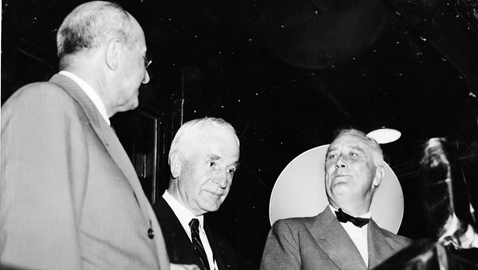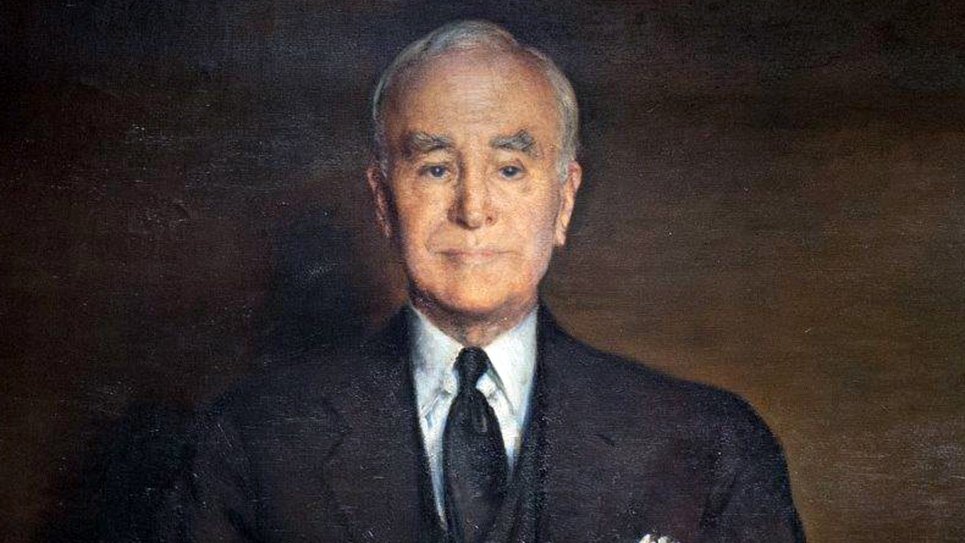Cordell Hull, remembered as the longest serving Secretary of State in the country’s history, almost abbreviated his service due to his unhappiness inside President Franklin D. Roosevelt’s Cabinet. Frequently feeling ignored, if not actually humiliated by a president who preferred guiding U. S. foreign policy himself, Hull began thinking of returning home to Tennessee and running for the United States Senate seat he had surrendered to accept a place in FDR’s Cabinet. A taciturn and extremely cautious man, Hull’s growing melancholy over having accepted the Cabinet post was doubtless increased by his wife Frances’ belief he should not have quit the Senate. Frances Hull was one of the leading socialites in Washington, D. C. and one of the very few people who knew Cordell Hull was far from healthy. Frances Hull had enjoyed life in the Capitol as the spouse of a senator. Frances also believed the pace of life in the United States Senate was much slower and less wearing than the oftentimes grueling and demanding job of Secretary of State. Worried for her husband’s health, Frances Hull had been opposed to her husband accepting the job from President Roosevelt in the first place.
When Hull resigned from the Senate, Governor Hill McAlister had to appoint a replacement who would serve until a 1934 special election. First elected in 1932, Hill McAlister had waged several hard fought and close elections to win the governorship. Finally successful, McAlister had been the instrument through which Tennessee’s senior United States senator Kenneth D. McKellar and E. H. Crump, leader of the Shelby County political machine, had cemented their domination over Tennessee politics. McAlister had beaten back a strong challenge from Lewis Pope in the 1932 Democratic primary only to see Pope bolt the party and run as an Independent in the general election. McAlister easily dispatched Pope in the fall election and almost immediately had to ponder a replacement for Cordell Hull in the U. S. Senate. There was no lack of aspirants who wanted Hull’s Senate seat, but Governor McAlister seemed to seriously consider only one candidate, Judge Nathan L. Bachman of Chattanooga. McAlister had been Bachman’s campaign manager in 1924 when Bachman, then a justice of Tennessee’s Supreme Court, had run for the United States Senate. Bachman had run a poor third behind Senator John Knight Shields and the winner, Lawrence D. Tyson of Knoxville. Bachman, in turn, had managed several of Hill McAlister’s gubernatorial campaigns in Hamilton County. McAlister appointed Nathan L. Bachman to the United States Senate the same day he received Cordell Hull’s letter of resignation.
Bachman had to run almost immediately to hold his Senate seat and faced determined opposition from Congressman Gordon Browning, who was an experienced and gifted campaigner. A veteran of the First World War, Browning was especially strong with many of Tennessee’s veterans. Browning, in keeping with Tennessee’s tradition that U. S. senators could not come from the same grand division, had thought of challenging Senator K. D. McKellar, who was also from West Tennessee. Many years later, Browning recalled he could not obtain a pledge of support from a single prominent Tennessean to run against the formidable McKellar. Undeterred, Browning announced he was running against Senator Bachman.
Now dominating politics in Tennessee, Senator McKellar and his political partner E. H. Crump moved behind Nathan Bachman. Browning complained during the senatorial primary that Bachman’s campaign was being run from Senator McKellar’s Washington office. An unsurpassed joke and storyteller, Nathan Bachman had quickly become a favorite of Vice President John N. Garner. Much to Gordon Browning’s dismay, Senator Bachman proved to be an able campaigner in his own right. Assured of the support of McKellar’s statewide machine and Crump’s organization in Shelby County, Browning’s initial status as the frontrunner began to evaporate. Browning ran a good race, but lost to Bachman.
Nathan Bachman’s ability as a vote-getter was something Cordell Hull had to take into account if he intended to leave Roosevelt’s Cabinet and return to Tennessee to reclaim his Senate seat. Hull began quietly talking to friends, both in Washington and Tennessee, indicating he might want to run for the Senate once again. Judge James Gardenhire was an especially close political associate of Hull’s and he began quietly sounding out whether Hull should resign as Secretary of State. The presumption of many of Hull’s friends was the Secretary of State was so revered and venerated in Tennessee that he would easily be elected no matter who ran in 1936. Hull slipped over to the Senate Office Building to see Senator McKellar and ascertain what his attitude would be if the Secretary of State were to run for the Senate once again. It soon became readily apparent Nathan L. Bachman enjoyed representing Tennessee in the United States Senate and having worked hard to remain there in 1934, had no desire to quit simply because Cordell Hull was not happy in President Roosevelt’s Cabinet. By September of 1935, there were rumors circulating that Senator Bachman was being considered for a federal judgeship. Bachman was quick to discredit the rumors, saying, “I couldn’t accept a federal judgeship. I am a member of congress.” The clear implication was a judgeship was being dangled before Nathan Bachman to induce him to leave the U. S. Senate so Cordell Hull could take his place. When queried about the rumor Hull intended to run against him, Bachman replied, “Losing no sleep over it.”
The rumors swirling around the judgeship began when Senator McKellar introduced legislation creating a new judicial seat for East Tennessee. Many believed McKellar was sponsoring the bill to reward Hill McAlister with the job following his retirement as governor of Tennessee. The fact the new judge was to be headquartered in Chattanooga caused some to believe the seat was intended for Nathan L. Bachman to pave the way for Cordell Hull’s triumphant return to the U. S. Senate. Once it became public knowledge Hull was dissatisfied with his Cabinet post, friends of the Tennessean tried hard to but the best face on it possible, explaining serving as Secretary of State cost Hull some $40,000 – $50,000 (the equivalent of almost $700,000 in today’s dollars), a financial burden he could ill afford. The source of Hull’s unhappiness at the State Department had nothing to do with money and everything to do with Franklin Roosevelt. In fact, Cordell and Frances Hull were wealthy by the standard of the day, although not extravagantly so. Still, with Roosevelt’s immense popularity with the public and especially Democrats, Cordell Hull needed an excuse to resign from the Cabinet if he intended to return to Tennessee to run for the Senate. Hull had planned a trip back home, which had been cancelled due to tensions between Ethiopia and Italy as Italian dictator Benito Mussolini prepared to invade the weaker African nation. Senator Bachman was telling anyone who would listen he was running again and had no intention to “relinquish his seat to any living human.”
It was certainly true that Cordell Hull had kept his hand in Tennessee politics while serving as Secretary of State. Quite a few Tennesseans find themselves employed by the State Department and some luckier still found themselves dispatched to foreign capitols as diplomats. One instance of Cordell Hull keeping an eye on Tennessee political matters was G. C. Sherrod of Humboldt, Tennessee. Sherrod had been Hull’s campaign manager in 1930 when Hull had run for the Democratic nomination for the United States Senate. In August of 1935, Sherrod had been hired as the special agent for Mexican claims inside the State Department. A former district attorney for Gibson County, Sherrod assumed his duties on August 28, 1935. There were even rumors that Senator Nathan Bachman might be named to an ambassadorial post, once again leaving the way clear for Cordell Hull to return to the Senate. Gordon Browning’s senatorial ambitions never died until his final defeat in 1954 and it was clear he intended to once again challenge Bachman for the Democratic nomination in 1936, or perhaps run for the gubernatorial, nomination, but Cordell Hull knew Browning would never oppose him in a Democratic primary.
Nathan L. Bachman was sending not so subtle signals of his own. The Nashville Tennessean reported on August 1, 1935 the senator was telling friends and associates in Tennessee he would be a candidate again in 1936 irrespective of who might run against him.
The gossip about Hull’s continued unhappiness in President Roosevelt’s Cabinet continued to be rife in both Washington, D. C. and Tennessee. In one respect, the rumors aided Nathan Bachman, as it kept prospective candidates against him from building organizations as none of them wished to compete with the popular Hull. Congressman J. Ridley Mitchell, a colorful campaigner and a master at shaking hands and slapping backs throughout his district, was eager to run for higher office and had been pondering a bid against Bachman in 1936. Representing Hull’s old Fourth District in the House of Representatives, Ridley Mitchell was horrified at the prospect of Hull running for the Senate and no one in Tennessee believed the congressman would dare to challenge the Secretary of State in a primary election. The longer Cordell Hull toyed with the idea of going home and running for his old seat in the United States Senate, the less time potential challengers to Nathan Bachman had to prepare for a senatorial campaign. No challenger could begin to mount a campaign against Senator Bachman, much less announce and begin traveling across the state until Cordell Hull finally made up his mind whether to remain in the Cabinet or come home to Tennessee.
Political rivalries in Tennessee were evidenced by Gordon Browning being crossed off the list of appointees to “an all-powerful advisory board” set into place for Franklin Roosevelt’s almost $5 billion work relief program. The Roosevelt administration decided the supervisory boarded needed a former congressman as a member and four men made the final list, including Gordon Browning. The President personally scratched through the name of one applicant, while Speaker of the House Joseph W. Byrns crossed out two others, leaving only Browning. Much to the surprise of everyone, neither Senators McKellar or Bachman objected to Browning’s appointment, although it may not have gotten that far. Browning’s appointment was killed by none other than Secretary of State Cordell Hull, who did not propose to promote a possible opponent for the U. S. Senate should he wish to run. The story was almost certainly leaked to the Nashville Tennessean by former congressman Gordon Browning.
There was also the problem of E. H. Crump. The Memphis Boss had never been an admirer of Hull while the latter was in Congress. Crump had supported Congressman Joseph W. Byrns who had announced his challenge when Hull declared for the United States Senate in 1930. Byrns would have been a very strong contender had he not withdrawn after he suffered a heart attack while making his formal announcement for the Senate. Crump had consolidated his hold on Shelby County and could have guaranteed Senator Bachman a huge majority inside his domain. Nor was it certain Senator McKellar would abandon his junior colleague, who was usually content to follow McKellar’s lead in the Senate. Gordon Browning, more and more a certain candidate for governor in 1936, began speculation that he would run a coalition ticket with Cordell Hull his running mate for senator to any opposition from McKellar and Crump. Nathan Bachman made his own intentions perfectly clear when he announced on October 13, 1935 he was a candidate for reelection. Interviewed by the Chattanooga Times before leaving on a trip to the Orient, Bachman stated he would “definitely” be a candidate the following year. “I didn’t know it was ever questioned that I will be a candidate to succeed myself,” Bachman said. “I certainly will be a candidate and at the proper time will make my formal announcement.” Bachman promised after Congress adjourned, “I shall return to the state to conduct a vigorous campaign.”
Cordell Hull began to change his mind, likely helped by the fact President Roosevelt desperately did not wish to lose the Tennessean. FDR realized all too well he could likely not find anyone more respected by the public and particularly the Congress. For the time being, Cordell Hull gave up his senatorial aspirations and was content to remain in Franklin Roosevelt’s Cabinet.







